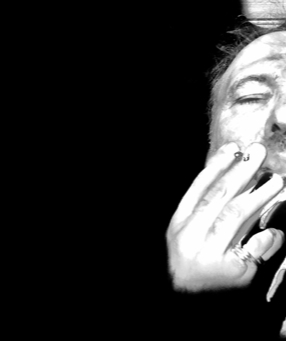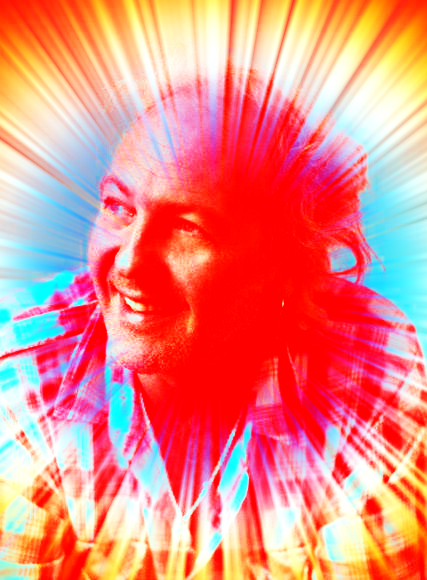Dirty squats and LSD meltdowns. Pirate utopias and underground bohemians. Poetic terrorists and the Beat Generation. Powerful themes run through the prolific life of musician extraordinaire Youth, aka Martin Glover.
They begin to seep through on the first page of Middle Class Riot, his latest volume of psychedelic prose and Dali-esque vignettes. It’s a book he dedicates to the late Brian Barritt, Timothy Leary’s partner in crime and a cosmic courier who pulled Youth through many a mad trip.
It was apt that the book launch itself was taking place in Notting Hill — the epicentre of London’s original sixties counterculture movement. It was here that I witnessed the art of being bohemian when a medley of artists oozing the ethics of resistance tumbled out onto the street to perform poetry and music to an audience of even more artists that gathered to celebrate the launch of Youth’s new book.
Youth’s psychedelic connection to forefathers of the counterculture was prominent in this moment, especially with the presence of 79-year old author, political activist and poet Lee Harris — the Notting Hill legend imprisoned in the Thatcher years for selling smoking paraphernalia at London’s oldest head shop, Alchemy. The ex-Beatnik encapsulates perfectly his adventures through sixties London with his writings of the Beat Generation and activism against South African Apartheid in his book, Echoes of the Underground. The first time I met Lee, he was standing behind his shop counter in bow tie and shirt, playing the dirtiest drum n’ bass you can possibly imagine. A cosmic coincidence perhaps, but it was also the moment I first met Youth.
Between Killing Joke, Paul McCartney and Pink Floyd, Youth has continued to nurture his connections with anarchic philosophers like Lee. The book launch would not have felt complete without him or without other humble heads like former Hawkwind saxophonist Nik Turner. Jah Chester and Mark Stewart added to the melange of aging yet immortalized dinosaurs while Eno-collaborator Ebe Oke and a bunch of other young guns jammed happily away to readings from the book.
These old school protagonists of underground, alternative culture have been around for a time — way before Youth’s prime — and have helped rescue him through some of the darkest, most twisted moments of his life.
They were my spirit guides on earth and who convinced me I was going through a shamanic initiation, and this is what was going to happen to me next and that I was not mad. Brian in particular gave me an incredible amount of support when I felt I wasn’t being authentic or real.
But I used to be really cocky about LSD, arrogant even and never thought I’d lose it.
It was 1982 and Youth had been taking LSD and mushrooms for a couple of years.
I met an old friend at the Victoria. We’d had a misunderstanding so he tells me, ‘if you’re really a friend of mine, then you’d better take this acid’.
“About half an hour later, I found myself in the attic of this bar, convinced that my friend and his dodgy mate were gonna kill me,” he says, recalling what is justified as a rather freaky moment on potent psychedelics.
Three days later, he was still tripping out and several weeks on, there was little sign of improvement when his friend freaked out and jumped off a railway bridge.
Tripping became more pronounced after that and I hadn’t taken anything for weeks. A doctor later explained to me that our bodies create DMT, a kind of LSD and for some reason, mine wouldn’t turn the tap off.
With DMT on tap, things inevitably got heavier when he was caught burning money on the King’s Road in nothing but a kimono and swimming trunks.
It was a cold January morning when they found me and carted me off to the mental hospital.
It’s a meltdown cliche really. All the time I’d been telling everyone they were mad and they’d be saying, ‘Youth is mad, don’t talk to him.’ So the night before my interview with a panel of doctors who were gonna decide if I should be sectioned or not — I meditated on a crystal given to me by my friend Dave the Wizard who used to eat fire at Killing Joke gigs and who lived in our squat with 20 feral cats and a dog called Heldon.
In that moment, I realised that under no circumstances do I tell them they’re mad and that I’m the sane one! Just tell them, I thought, that I’ve done a bit of LSD and that I just wanna go home and see my mum. So I did exactly that and they let me go.
I later realised this was the shamanic initiation I was waiting for, the ‘lick from the mother’s tongue’ and it’s led me through a 25-year school of mystery that’s informed my work ever since. Not recommended for the sensitive soul. It was remarkable I survived with my mind intact. I could so easily have become Syd Barrett or Peter Green and not made it back to earth.
Youth had lost the plot. He scattered his marbles and learned some lessons. He admits:
The major breakthroughs I’ve had with music have been facilitated by DMT and other psychedelics, so without my meltdown, I’d probably still only be a bass player looking for a singer, or more likely I would have left music and become a mini cab driver in Glasgow.
I’ve meditated on this very thought many times. Life can turn on a penny sometimes, specially with the slight coincidences and weird serendipity that’s led to amazing creative projects, transforming completely my journey on numerous occasions. It’s a mystery I don’t question, but pay attention to rigorously.
The punk and post punk energy from which Youth emerged has led to a diversity of projects, including The New Banalists Orchestra, comprising the anarcho-activist spirit of Crass founder Penny Rimbaud on the track “Mammon,” featured on the album Politics of Envy. Beats n’ pieces mashed with spoken word venture way beyond the iconoclastic spirit of the Beat Generation.
The continuation of sound into a brand new dawn is part of the journey for Youth as he proceeds to work with an eclectic spectrum of artists like Zikr, The Orb, Killing Joke, Jah Wobble, Mixmaster Morris, David Barbarossa, Davide Rossi, Mundy, Spiritualized and David Gilmour.
Youth has relentlessly absorbed the lessons of a prolific life, keeping a foot in the underground while elevating amidst the highest echelons of the music business. He’s well and truly connected to the roots that set flight to an artistic career that knows no bounds. He demonstrates that acknowledgement by continuing to work with the likes of Lee Scratch Perry while nurturing young talents like Cosmic Trigger in his south London home studio.
The kaleidoscopic flurry depicting a few decades of counterculture heritage was all witnessed in a day’s work in Notting Hill the other week. Youth encountered the evolution of the activist movement, following its course from the streets of Portobello to the riots of Brixton and to the rave-olution that took his Butterfly Studios by storm. Navigating the flow of different eras, Youth seems to have time-travelled through some iconic moments of counterculture history.
The momentum has led him to the comfort of his modest family home, the walls of which are adorned by record plaques of the platinum-selling artists that he’s worked with. He lives in a very busy house: artists seem to be coming, going and milling about most of the day and there’s an energy of productivity ripe in the air. Youth’s son pops his head round the studio door. “Brother Culture’s here dad.” He says, “Just give him a cuppa, I’ll be there in a bit…”
It must be a handful to have a dad like Youth — and a lot to live up to. “They don’t really pay any attention to what I tell them, and for me, that’s a sign of good parenting,” he says before resuming. “I just don’t wanna be like one of those actors trying to make it as a singer.”
To be critically acclaimed in one field like music while seeking to make it in another is both a blessing a curse. Youth is quick to recognize this yet he’s taken a leap of faith in launching himself publicly as a poet and writer.
Working with Paul McCartney and Lee Scratch Perry has taught me that you are only creatively contained by your own perception of who you are. As an artist you can go anywhere you like… People may or may not get it, but you can determine your own course. Of course, some may disagree with your choices, but it’s important not to seek (too much) approval as an artist. People used to say to me: you’ll become a “jack of all trades and master of none” and I would reply, “jack of all trades, master of one.”
The title Middle Class Riot itself seemingly relates to the politic of the punk and post punk spirit. So is it a riot because austerity measures have widened the gap between rich and poor, threatening to wipe out whatever is left of the middle class?
“It represents all of that,” he says, “but it also represents the current Ayahuasca phenomena sweeping across the planet; something that transforms us beyond class, race, gender and towards the unified field of inter-connectivity.”
Youth’s support for the therapeutic use of psychedelic drugs has been ongoing for decades.
After 35 years of prohibition, there’s scant research on what they are and what they do. DMT is the only chemical we possess inside of our bodies yet it’s illegal to possess outside of our bodies! New research suggests that DMT is responsible for our most intimate experiences, including falling in love and the orgasm!
So the year was 1993. The place was Brixton. Youth was about to take his first potent dose of pure pink DMT. It was to be a life-changing experience that would revolutionize and transform electronic music as we knew it back then — and it was an experience that was to take place in the company of Terence McKenna.
We had sent him an invitation on the behalf of the Society for the Reformation of Ancient Enchantment, of which I was a founder member.
When he arrived, I was introduced to him by the late, great Frasier Clarke, who had started Megatripolis and the Multiversity. We were in my garden at Butterfly when ceremonially, we accepted the dosage he administered to myself, Raja Ram and to about five others. It was a catalytic moment and mythology has it that it was the moment that Psychedelic Trance was born.
It was indeed and as Youth swung open the doors to Butterfly Studios, half of London’s squat scene swarmed in.
I’ve seen how Terence’s legacy and pioneering work has been followed through by new writers like Jeremy Narby and Daniel Pinchbeck. It’s also good to see how governments are slowly allowing people the license to research again. And I passionately support organisations like MAPS (Multi-disciplinary Association of Psychedelic Studies) and others that lobby governments about legislation and reform of our drug laws. On a simple level, it’s really all about liberty.
Youth has witnessed friends and collaborators experience the brunt of anti-drug laws. Brian’s Barritt’s epic overland journey across India and Afghanistan ended in prison when he was arrested for the cannabis found in the lining of his waistcoat. His book The Road to Excess was written in jail, smuggled out and finally published, receiving praise from the likes of William Burroughs. Later on, Brian made his way to Algeria where he co-wrote Confessions of a Hope Fiend with Timothy Leary was hiding out under the protection of the Black Panthers.
Psychedelics open you up to different levels of perception, awareness and communication. They allow your psyche free reign to roam and actually give you access to whole new dimensions beyond time and space, reconnecting us to the nature surrounding us, reminding us that we are only a tiny part of that matrix of creation.
Middle Class Riot is Youth’s ode to the psychedelic revolution and to the likes of Leary and his confrontation of the underground’s infiltration. But does today’s activist movement cut it with as much conviction?
It’s always there. It’s archetypal and will never go away. It’s part of our DNA and what makes us human. It’s an expression from Dyonisian cultures to Shivaistic to the Beats to Druid wild wisdom and music from the Velvet Underground to Acid House and Ambient and beyond. It will always be changing and shapeshifting through our culture and arts. I hope to see another summer of love soon. Just imagine what the world would be like if we hadn’t had the sixties counterculture revolution? Imagine a world without the Beatles making Sgt. Pepper? A world without Lee Scratch perry? Utterly ridiculous…”












